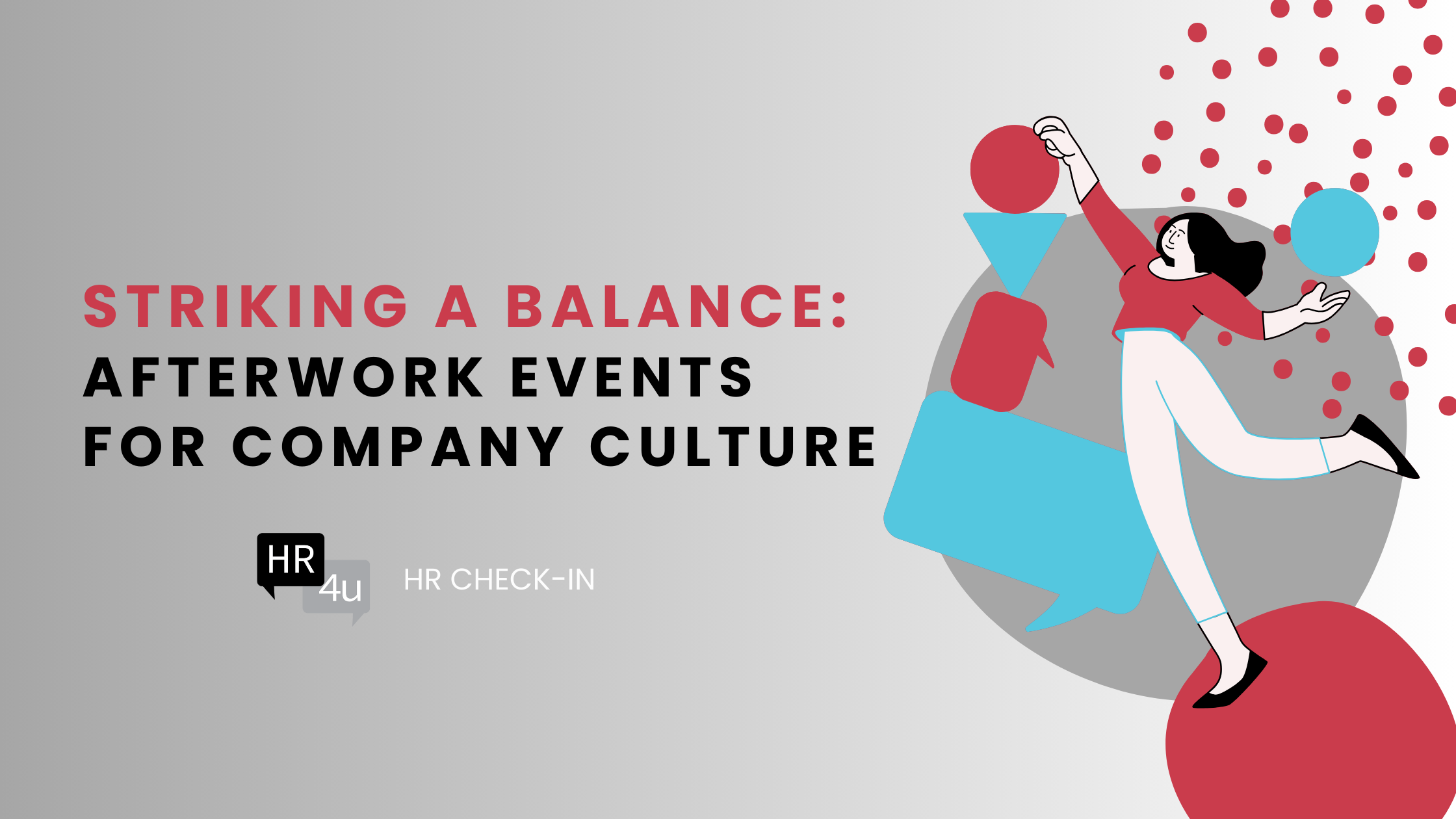Afterwork Events for Company Culture
In the ever-evolving landscape of modern workplaces, the debate surrounding afterwork events continues to simmer. Employers often grapple with the question of whether these social gatherings contribute positively to company culture or inadvertently encroach on employees’ personal time, potentially harming the very culture they seek to build. In today’s edition of HR Check In, we’ll explore both sides of the argument, weighing the pros and cons of afterwork events from an HR perspective.
Team Building:
Afterwork events provide an informal setting where employees can interact outside the confines of the office. This fosters stronger interpersonal relationships, enhancing teamwork and collaboration during regular working hours.
Invasion of Personal Time:
One of the most significant concerns is the potential infringement on employees’ personal time. Afterwork events might be viewed as an obligation rather than an optional social gathering, leading to resentment and burnout.
Boosting Morale:
Socializing after work can serve as a morale booster, giving employees a chance to unwind and relax. A happier workforce is likely to be more engaged, productive, and committed to their roles.
Impact on Work-Life Balance:
Regular afterwork events can blur the boundaries between professional and personal life, contributing to a skewed work-life balance. This imbalance may lead to increased stress and decreased job satisfaction.
Networking Opportunities:
These events can create valuable networking opportunities. Employees from different departments or levels may connect in a more relaxed environment, fostering a sense of camaraderie and understanding across the organization.
Exclusion and Alienation:
Not all employees may feel comfortable or interested in attending afterwork events. This could lead to feelings of exclusion or alienation among certain individuals or groups, potentially fracturing the team dynamic.
Showcasing Company Culture:
Well-planned afterwork events can be an extension of the company’s culture. They allow employees to experience the organization’s values in action, reinforcing a positive and inclusive work environment.
Logistical Challenges:
Coordinating afterwork events can be logistically challenging, especially for companies with remote or geographically dispersed teams. Ensuring everyone has equal access to these events can be a considerable hurdle.
Finding the right balance for afterwork events involves thoughtful planning and consideration of employees’ diverse needs and preferences. Here are some solutions to strike that delicate balance:
Make Events Optional:
- Ensure that attendance at afterwork events is entirely optional. Communicate clearly that participation is not mandatory, and there will be no negative consequences for those who choose not to attend.
Diversify Event Types:
- Offer a variety of afterwork events to cater to different interests and preferences. Not everyone enjoys the same activities, so having a mix of options, from casual happy hours to volunteer opportunities or sports events, can appeal to a broader range of employees.
Rotate Event Times and Days:
- To accommodate various schedules, rotate the times and days of afterwork events. This ensures that employees with different commitments or preferences have the chance to participate without feeling excluded.
Include Remote and Global Teams:
- If your company has remote or globally dispersed teams, incorporate virtual elements into afterwork events. This could include online gaming sessions, virtual trivia, or video conference meet-ups. By doing so, you create an inclusive environment for all employees, regardless of their physical location.
Seek Input from Employees:
- Involve employees in the decision-making process by seeking their input on the types and frequency of afterwork events. Conduct surveys or hold focus groups to understand their preferences and tailor events accordingly.
Budget Consideration:
- Be mindful of the financial aspect of afterwork events. Not everyone may have the means to participate regularly in costly activities. Offer a mix of low-cost or subsidized events to ensure that financial constraints don’t prevent employees from joining in.
Celebrate Milestones During Work Hours:
- Instead of relying solely on afterwork events, consider celebrating milestones, achievements, or special occasions during regular working hours. This allows everyone to participate without impacting their personal time.
Promote Flexibility:
- Encourage flexibility in work schedules to accommodate afterwork events. For example, allowing employees to adjust their hours on event days or offering flexible scheduling can help mitigate concerns about work-life balance.
Communicate Clearly:
- Transparency is crucial. Clearly communicate the purpose of afterwork events, emphasizing that attendance is optional and that the company values the well-being and personal time of its employees.
Evaluate and Adjust:
- Regularly assess the impact of afterwork events on company culture and employee satisfaction. Solicit feedback, and be willing to adjust your approach based on the evolving needs and preferences of your workforce.
While afterwork events can undoubtedly contribute positively to company culture, striking a balance is essential. HR must be mindful of the potential drawbacks, such as the invasion of personal time and feelings of exclusion. By approaching these events with consideration and inclusivity, employers can harness their benefits and build a more cohesive and vibrant workplace culture. Ultimately, it’s about finding a middle ground where socializing enhances, rather than hinders, the overall employee experience.
